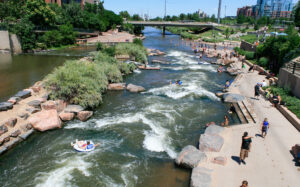Established in 1958, the Colorado Water Congress serves as the principal voice of Colorado’s water community and provides leadership on key water resource issues. The Water Congress has 350 member organizations representing diverse interests and water uses in all of Colorado’s seven major river basins. In this interview Doug Kemper, executive director of the Water Congress, speaks with Irrigation Leader about how the organization has continued operations during the COVID‑19 pandemic.
Irrigation Leader: Please tell us about your background and the Water Congress.
Doug Kemper: I’ve been with the Water Congress for 14 years. Prior to that, I managed the planning, development, and operation of the City of Aurora’s raw water system for 20 years. Before that, I was a water resources engineer for a small consulting firm. I have bachelor’s and master’s degrees in civil engineering and water resources.
The Water Congress was created in 1958 by Governor Stephen McNichols, who provided money from his executive funds, and Attorney General Duke Dunbar, who provided the human resources to run the organization. We now have a small staff of four. We focus on the legislature. On average, we work on 40 bills that affect Colorado water law in one way or another every year. We’ve had an excellent track record over the last 40 years. Rarely does a bill we oppose pass. On the flip side, about 85 percent of bills we support become law. We also host the two largest water events in the state.
Irrigation Leader: How has the COVID‑19 pandemic affected your operations?
Doug Kemper: It’s affecting every aspect of what we do. Essentially all our members, from agricultural to municipal water users, from law firms to engineering companies, are suffering serious financial disruptions. How will they prioritize support for our organization and its mission? We haven’t as yet seen organizations drop their memberships. Certainly, every nonprofit is going to have to justify its importance to their funders if they are to continue to exist.
Over the past decade, we’ve worked to diversify our sources of revenue. Major effort has gone into large events. About 40 percent of our operating capital is from net revenue from events. However, it is uncertain when large gatherings will be legally permitted, when it will be safe for members to attend, and when budgets will include training and travel. We

will need to adapt how we deliver information, training, and networking opportunities, at least for the next year or two. We have been having weekly virtual meetings with our members to keep them informed. These have become popular.
We know that our operations must change and that we need new solutions to fulfill our mission. In searching for answers, we have found plenty of false summits and dead ends. However, I am confident that our path forward will be sound. I am fortunate to have an astute board, resolute staff, thoughtful colleagues, and supportive members.
Irrigation Leader: What is your organization doing to help its employees and members stay safe?
Doug Kemper: We’re all working from home and will continue to do so well into the summer. We have not yet worked out exactly how our future work environment will function.
Irrigation Leader: What is the most innovative thing you’ve done to maintain your workflow?
Doug Kemper: I am excited by how our thinking about organizational planning is developing. We have the opportunity and the time to re-examine how we manage finances, balance revenue risks, and understand member needs. For the first time, we will engage in a robust scenario planning process that will help us position the organization for future success.
Irrigation Leader: Do you expect any of the changes you have made to be retained after the pandemic is over?
Doug Kemper: Yes, we are now a lot more comfortable getting things done through videoconferencing and working from alternate locations and at alternate hours. Perhaps we can get things done without spending so much time traveling to and from meetings. We are likely to continue with frequent virtual membership meetings.
Irrigation Leader: Can your board conduct business and hold votes electronically in Colorado?
Doug Kemper: Yes. We have done that in the past and can vote by e-mail when needed. We will use videoconferencing for at least the next two board meetings.
Irrigation Leader: Do you have any advice for other associations?
Doug Kemper: Stay positive. Listen to your members. Be patient. Be cautious. Be helpful. Befriend uncertainty. Prepare for many outcomes. Encourage staff to try new things. Develop a plan and implement it. Ask for support when you need it. Things will look better in the morning.
Doug Kemper is the executive director of the Colorado River Congress in Denver, Colorado. He can be contacted at dkemper@cowatercongress.org or (303) 837‑0812, ext. 1.
